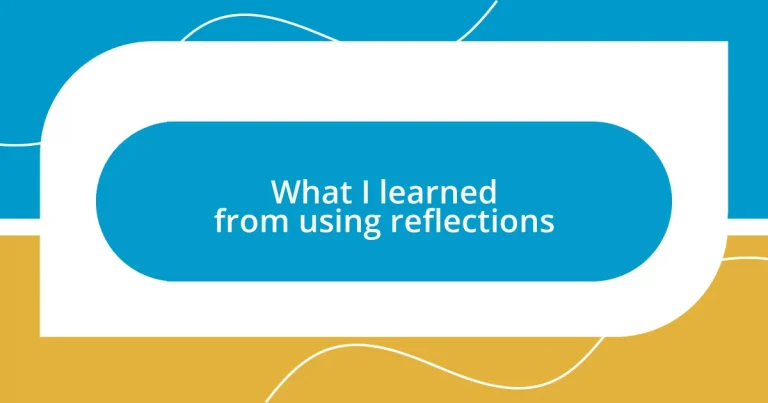Key takeaways:
- Reflections enhance self-awareness and emotional regulation, transforming challenges into valuable learning experiences.
- The practice of regular reflection fosters personal growth, gratitude, and improved relationships through deeper understanding and clarity.
- Integrating feedback and setting intentions for reflections lead to more purposeful insights, guiding future decisions and personal development.
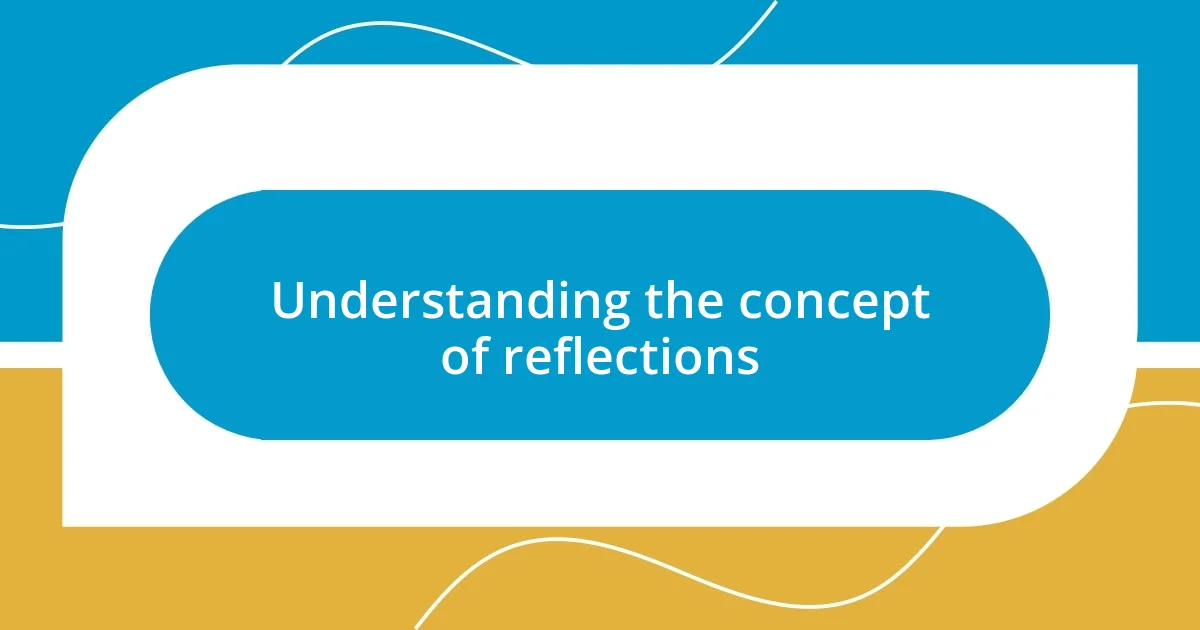
Understanding the concept of reflections
Reflections, at their core, are about looking inward to examine our thoughts and feelings. I remember the first time I consciously reflected on a challenging day; it felt like holding a mirror up to my soul. What surprised me was how understanding my emotions helped me unravel not just that day’s challenges but patterns in my behavior that I had never noticed before.
When I think about reflections, I can’t help but ask: how often do we take a moment to truly pause and consider our experiences? In my own journey, those pauses have often led to profound realizations. For instance, I once grappled with a decision at work. By writing down my thoughts and reflecting on them, I not only found clarity but also discovered a deeper self-awareness I hadn’t anticipated.
The beauty of reflections is that they provide a framework for growth. Each time I revisit my experiences through this lens, I feel a sense of empowerment. It’s as if I’m collecting valuable lessons, ready to apply them in future situations. Have you ever had that exhilarating moment when a simple thought turns into a breakthrough? That’s the magic of understanding reflections; it opens doors to endless possibilities for personal development.
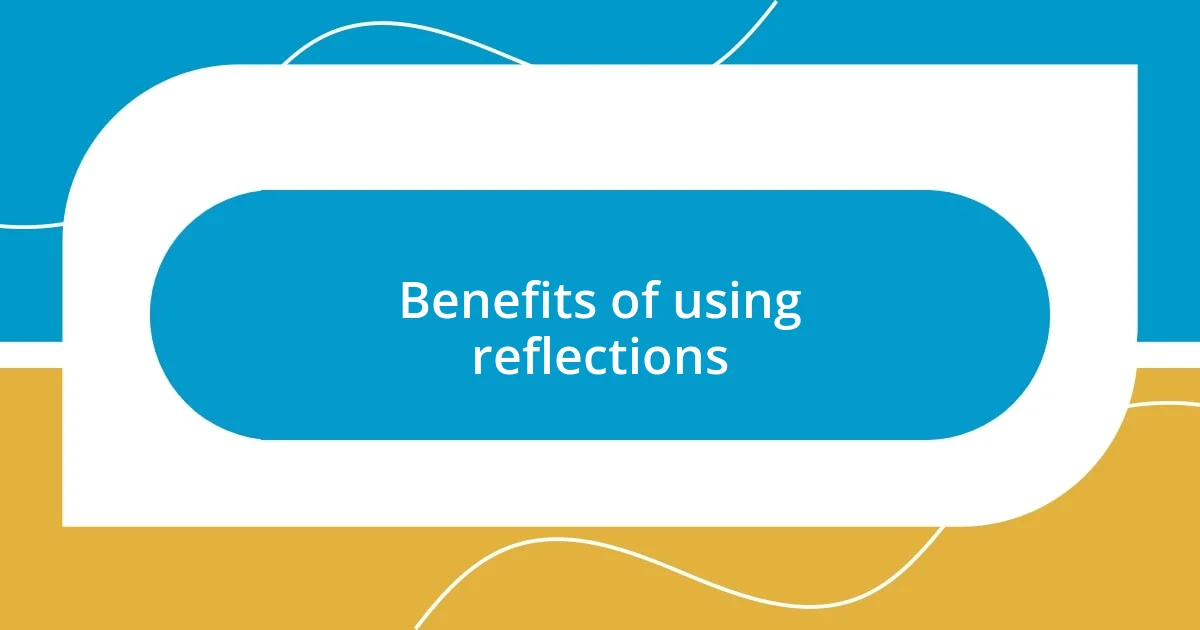
Benefits of using reflections
One of the key benefits I’ve experienced from using reflections is enhanced self-awareness. When I started to write down my daily thoughts, I found that I began to recognize patterns in my emotions and decisions. There was a time when I was often frustrated in social settings. Through consistent reflection, I pinpointed that my feelings stemmed from expectations I placed on myself. Suddenly, the frustration transformed into understanding, allowing me to approach social interactions with a more open mindset.
Additionally, reflections foster a sense of gratitude that I didn’t fully appreciate before. By reviewing my day, I started to focus on the positive moments, no matter how small. This shift in perspective can be transformative. Here are some key benefits I’ve noted:
- Improved emotional regulation: Understanding the triggers behind my emotions helps me respond more thoughtfully.
- Clarity in decision-making: Reflecting on past choices provides insight that steers future decisions.
- Heightened resilience: Lessons learned through reflection equip me better for facing challenges.
- Increased mindfulness: Regularly reflecting encourages me to be present and engaged in my daily experiences.
- Strengthened relationships: By examining my interactions, I can communicate more effectively and empathetically.
Each of these benefits contributes to my overall well-being, creating a more fulfilled and intentional life.
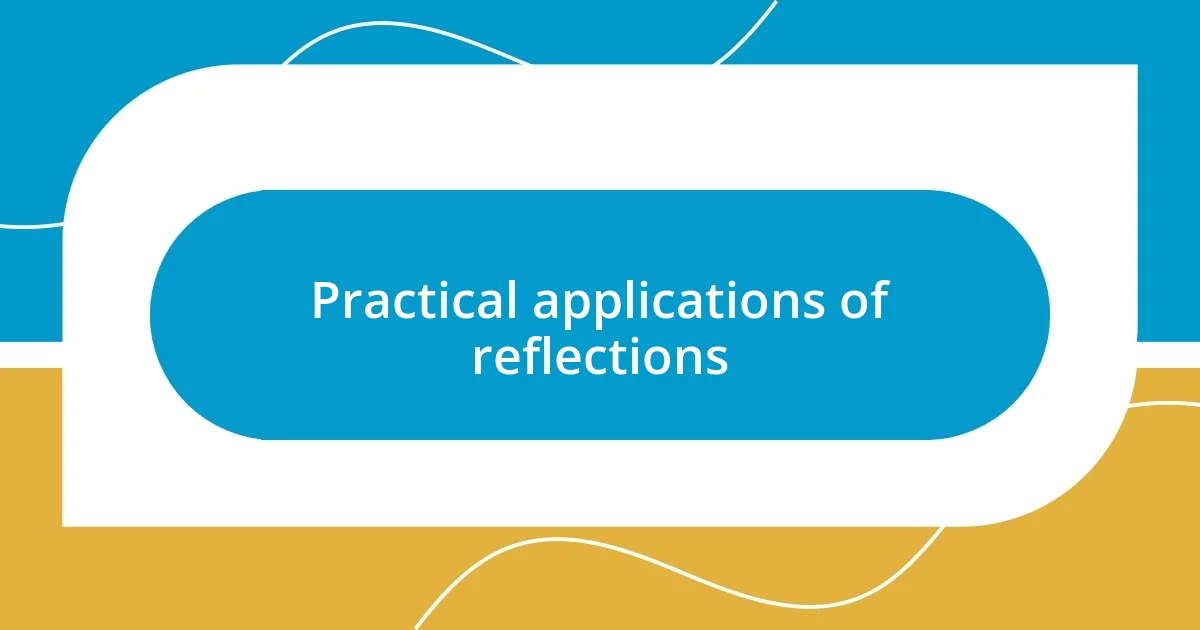
Practical applications of reflections
Reflections have a plethora of practical applications that can seamlessly integrate into our daily routines. For instance, I’ve found that incorporating reflection into my weekly planning has vastly improved my productivity. Every Sunday, I take a moment to assess the previous week, jotting down what worked and what left me feeling unfulfilled. This process not only prepares me for the week ahead but also highlights areas where I can grow, make changes, and set myself up for success.
Another area where reflections shine is in personal relationships. I remember a time when I had an unresolved conflict with a friend. Instead of sweeping it under the rug, I decided to reflect on my feelings and motivations for my reactions. This introspection led to a heartfelt conversation, allowing us both to articulate our perspectives. It was profoundly liberating to understand my emotions better, and the outcome was a stronger bond rooted in understanding. Reflecting genuinely transformed my approach to conflict resolution.
In the workplace, I’ve found that journaling about my experiences enhances my professional development. By reflecting on meetings and projects, I glean insights about my working style and interactions with colleagues. This habit has particularly helped me identify my strengths and areas for improvement, which is something I wish I had started earlier in my career. When I actively engage in this reflection, it feels like unlocking a treasure chest of knowledge that I can draw upon for future tasks and relationships.
| Application | Description |
|---|---|
| Weekly Planning | Assess previous week to improve productivity and highlight growth areas. |
| Conflict Resolution | Use reflections to understand emotions, leading to constructive conversations and stronger relationships. |
| Professional Development | Journaling experiences to identify strengths and areas for improvement in work settings. |
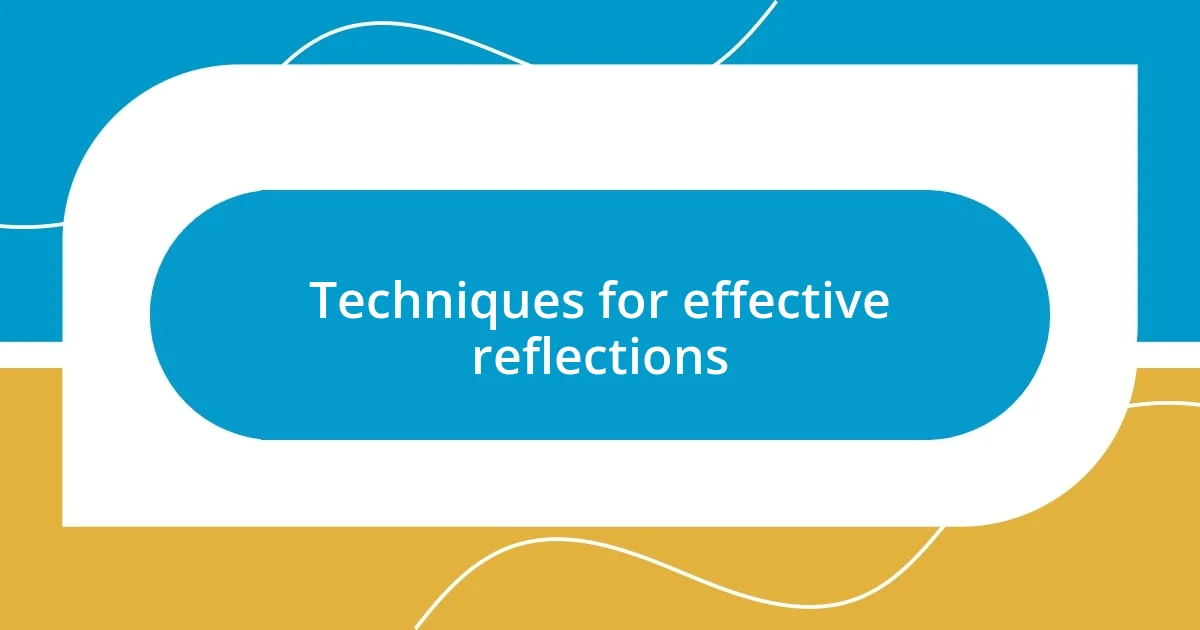
Techniques for effective reflections
When refining your reflections, one effective technique is to use guided prompts. I often find myself stuck, unsure of what thoughts I should explore. By asking myself questions like, “What made me smile today?” or “What lesson did I learn from a challenge I faced?” I unlock deeper insights that might have otherwise remained buried. These prompts not only spark my memory but also transform the act of reflection into a meaningful dialogue with myself.
Another powerful method is to create a mood board or vision board alongside your written reflections. Personally, I started doing this when I wanted to visualize my goals and feelings more vividly. By cutting out images and words that resonate with my emotions and aspirations, I find I can articulate my thoughts in ways that writing alone sometimes fails to capture. The colorful visuals ignite my passion and remind me of the unique journey I’m on.
Lastly, it’s essential to revisit and revise your reflections regularly. I’ve learned that when I look back at previous entries, it often reveals my growth—and sometimes, my stagnation. I ask myself, “Am I still facing the same challenges, or have I moved past them?” This process not only promotes a deeper understanding of my experiences but also holds me accountable for my personal development. It’s a practice that truly keeps me connected to my evolving self.
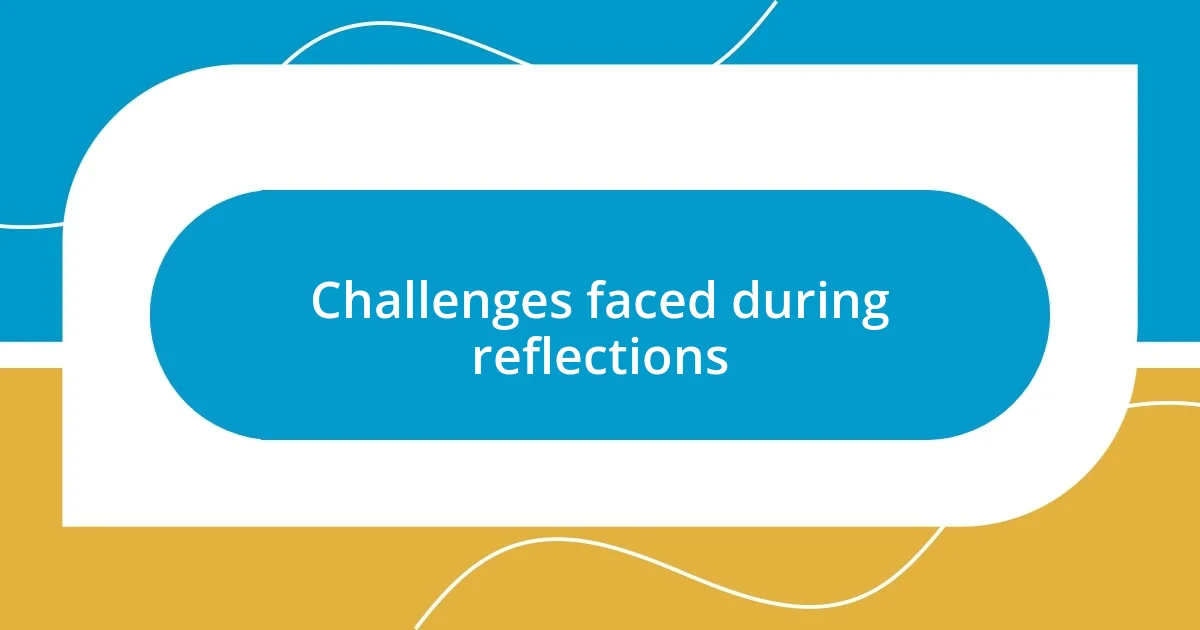
Challenges faced during reflections
Facing challenges during the reflection process can be surprisingly daunting. I remember struggling to confront certain feelings after a failed project; it felt easier to dodge the discomfort rather than examine what went wrong. This avoidance often led me to a clearer understanding later on, but in the moment, the emotional weight was heavy. Have you ever felt that tug-of-war between wanting to reflect and wanting to shy away from uncomfortable truths?
Another obstacle I encountered was time management. Finding quiet moments to pause and reflect in our busy lives isn’t easy. I often found myself squeezing reflections into a packed schedule, making them feel rushed and superficial. The irony is that, in trying to save time, I actually lost valuable insights that could have transformed my understanding of a situation. How do you carve out that essential space when life gets overwhelming?
Lastly, there’s the challenge of honesty. I’ve faced moments where admitting my shortcomings felt like pulling off a band-aid—painful but necessary. I recall a specific time when I reflected on a big career decision, and the truth hit hard: I had been prioritizing others’ expectations over my own desires. That raw honesty, while uncomfortable, ultimately freed me to make choices that aligned with my true self. Isn’t it fascinating how confronting our reality can lead to profound growth, even when the pathway is rocky?
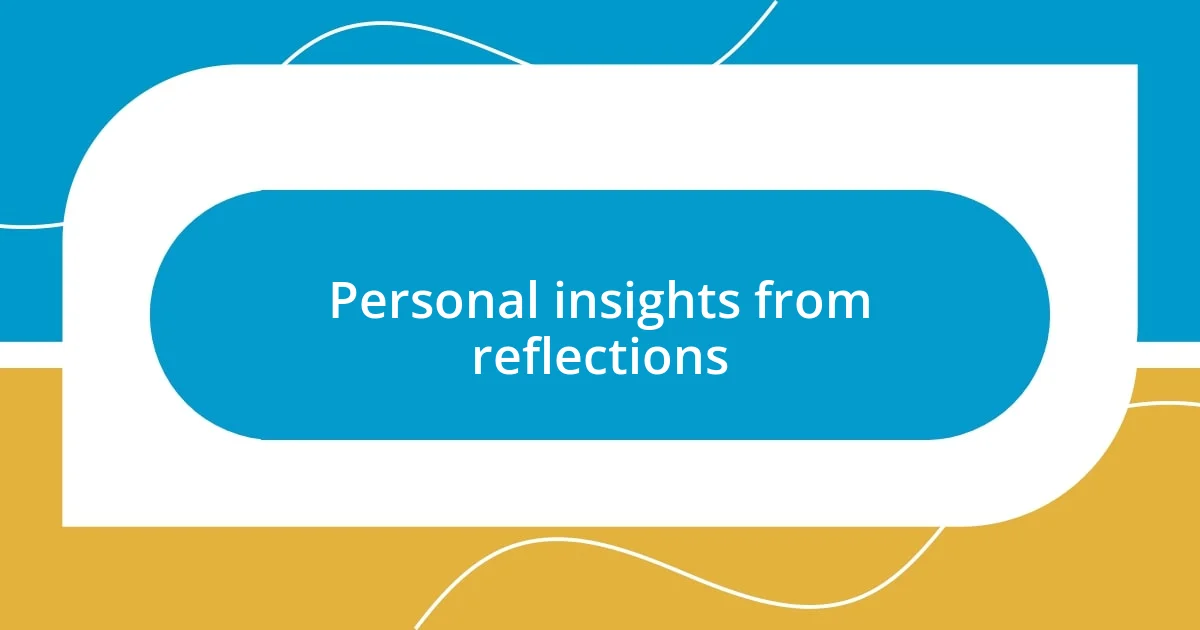
Personal insights from reflections
The most striking personal insight I’ve gained from reflections is the power of vulnerability. I once wrote about a time I hesitated to share my ideas in a team meeting. While the fear of judgment held me back, reflecting on that moment revealed just how much I had limited myself. This realization was eye-opening—I understood that embracing vulnerability not only fosters connection with others but also leads to my personal growth. Have you ever considered how authenticity can transform your interactions?
As I’ve delved deeper into my reflective practices, I’ve discovered that recording my emotions during high-stress moments can be particularly enlightening. For instance, after a tense discussion with a friend, I took a moment to jot down how I felt. The act of writing allowed me to dissect my feelings, leading to clarity that helped improve our relationship. I often ask myself, “What would I have missed if I hadn’t captured that emotion in the moment?” The simple act of documenting my emotional state has intricately woven a richer tapestry of understanding in my life.
Additionally, I’ve realized the significance of setting intentions before reflecting. There was a period when I would jump into reflections without a clear purpose, and the results were often muddled. By consciously determining what I wanted to gain—whether it was closure, clarity, or inspiration—I found that my reflections became more purposeful and beneficial. Have you ever thought about how your intentions shape the outcomes of your reflections? This small adjustment has truly transformed my reflective practice into a meaningful journey toward self-discovery.
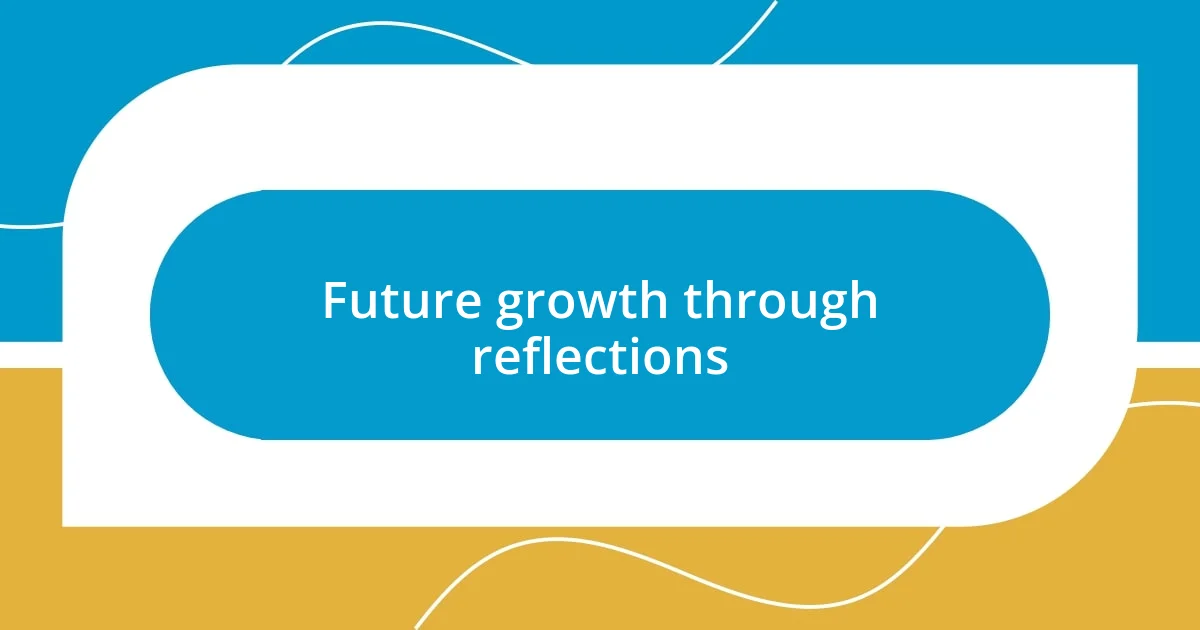
Future growth through reflections
When I think about future growth through reflections, one particular experience stands out. There was a time when I looked back on a crucial presentation that didn’t go as planned. Rather than wallowing in disappointment, I took the time to analyze what went wrong. This reflection not only helped me pinpoint areas for improvement but also filled me with a renewed determination. Have you ever had a moment where reflecting turned a setback into a stepping stone for growth?
I’ve found that reflecting on my goals can serve as a powerful compass for my future. Recently, I revisited my aspirations from a few years back and noted the progress I had made, but also the dreams I had set aside. It was enlightening to see how much I had changed and how some of those forgotten dreams still ignited passion within me. Isn’t it remarkable how looking back can often illuminate the path forward?
Moreover, I’ve learned that integrating feedback into my reflections is essential for growth. A while ago, after receiving constructive criticism from a mentor, I felt deflated yet resolved. By reflecting on their insights and discussing them with peers, I discovered new perspectives and pathways I hadn’t considered before. Engaging with others in this way not only expanded my understanding but also strengthened my resolve to embrace future challenges. How often do we invite external reflections to enhance our journey?












